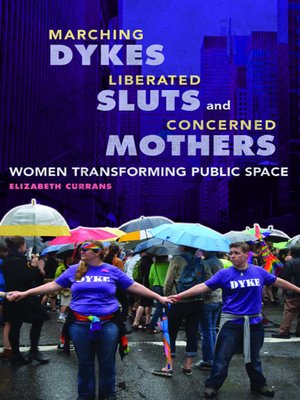Marching Dykes, Liberated Sluts, and Concerned Mothers
ebook ∣ Women Transforming Public Space
By Elizabeth Currans

Sign up to save your library
With an OverDrive account, you can save your favorite libraries for at-a-glance information about availability. Find out more about OverDrive accounts.
Find this title in Libby, the library reading app by OverDrive.



Search for a digital library with this title
Title found at these libraries:
| Library Name | Distance |
|---|---|
| Loading... |
From the Women in Black vigils and Dyke marches to the Million Mom March, women have seized a dynamic role in early twenty-first century protest. The varied demonstrations—whether about gender, sexuality, war, or other issues—share significant characteristics as space-claiming performances in and of themselves beyond their place in any broader movement. Elizabeth Currans blends feminist, queer, and critical race theory with performance studies, political theory, and geography to explore the outcomes and cultural relevance of public protest. Drawing on observation, interviews, and archival and published sources, Currans shows why and how women utilize public protest as a method of participating in contemporary political and cultural dialogues. She also examines how groups treat public space as an important resource and explains the tactics different women protesters use to claim, transform, and hold it. The result is a passionate and pertinent argument that women-organized demonstrations can offer scholars a path to study the relationship of gender and public space in today's political culture.|
Cover
Title
Contents
Preface
Acknowledgments
Introduction: Regendering Public Spaces
Part I. Responding to Danger, Demanding Pleasure: Sexualities in the Streets
1. Safe Space? Encountering Difference at Take Back the Night
2. Enacting Spiritual Connection and Performing Deviance: Celebrating Dyke Communities
3. SlutWalks: Engaging Virtual and Topographic Public Spaces
Part II. Gendered Responses to War: Deploying Feminities
4. Demonstrating Peace: Women in Black's Witness Space
5. Uncivil Disobedience: CODEPINK's Unruly Democratic Practice
Part III. Engendering Citizenship Practices: Women March on Washington
6. Embodied Affective Citizenship: Negotiating Complex Terrain in the March for Women's Lives
7. Participatory Maternal Citizenship: The Million Mom March and Challenges to Gender and Spatial Norms
Conclusion: Holding Space: The Affective Functions of Public Demonstration
Notes
Works Cited
Index
|
"This book is a much needed volume reflecting on feminist movements of the past to inform the future. As we face our contemporary era, Currans's volume is urgent and pressing."—Kath Browne, coauthor of Lesbian Geographies: Gender, Place and Power
"As we enter a new era of public protest, Currans offers a feminist and queer guide to holding public space. Her beautifully rendered and theoretically sharp ethnography illuminates the effect of organizing, the ways that witnessing, marching, lobbying, and demonstrating transforms lives in the process of developing counterpublics."—Eileen Boris, coauthor of Caring for America: Home Health Workers in the Shadow of the Welfare State
"Empirically rich, and boasting extensive quotations from protest participants, the main strength of Curran's account—from a cultural geographer's perspective—is that it examines how space can be transformed via embodied performance: she turns to queer, feminist and critical race theory to emphasize the performance force of counterpublic spaces." —Cultural Geographies
|Elizabeth Currans is an associate professor of Women's and Gender Studies at Eastern Michigan University.
"As we enter a new era of public protest, Currans offers a feminist and queer guide to holding public space. Her beautifully rendered and theoretically sharp ethnography illuminates the effect of organizing, the ways that witnessing, marching, lobbying, and demonstrating transforms lives in the process of developing counterpublics."—Eileen Boris, coauthor of Caring for America: Home Health Workers in the Shadow of the Welfare State
"Empirically rich, and boasting extensive quotations from protest participants, the main strength of Curran's account—from a cultural geographer's perspective—is that it examines how space can be transformed via embodied performance: she turns to queer, feminist and critical race theory to emphasize the performance force of counterpublic spaces." —Cultural Geographies
|Elizabeth Currans is an associate professor of Women's and Gender Studies at Eastern Michigan University.







